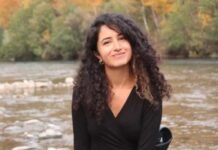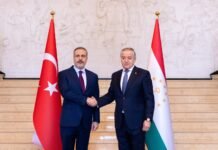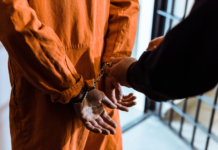Stockholm Center for Freedom (SCF) has received further details about horrific tales about ongoing torture and abuse in an exposed unofficial detention facility in Turkish capital as well as in police detention center.
A letter sent by a lawyer whose name was kept anonymous by SCF for safety reasons recounted how his client endured an abuse at the hands of police units first in a sporting hall that is owned by State Water Works (DSİ) and that was used as unofficial holding place for detainees and then later in a police detention center.
The letter starts by saying that “I feel totally ashamed as a jurist for gross human rights violations and heavy torture practices I have come to know while I was practicing my [lawyer] profession”. He asks not only his name be kept confidential but also his client for fear of their lives and negative repercussions for sharing details of torture. He said he would like the world to know how his client, a teacher by profession, underwent through torture in police custody in Turkish capital Ankara.
The teacher was detained in yet the largest single wave of detentions in Turkey with some 1,000 people being placed under police custody on alleged charges of terrorism that targeted members of Gülen movement as part of Turkish government persecution campaign against the civic group. Hundreds were locked up in an unofficial detention center in DSİ facility on Eskişehir road close to Ankara.
The lawyer who wrote to SCF said he learned about the DSİ facility when he visited his client in Ankara police department. According to victim’s account, police first took them to this facility, kept them for a while as they faces abuse there and later took them to a police station in groups.
The victim told the lawyer that “When we were detained, police took us to a sporting hall. We were some 150 people. There was only one toilet and one washbasin. We were forced to sleep on the floor on top of each other for several days. Then, we were transferred to detention center in Ankara police department. Now I am staying with 14 other people in six square meters’ cell.
After the work hours when few people left in the building, police come to our cell often in middle of the night and calls out a name to be taken away. In a dark room, they strip the person’s clothes off, leaving him naked, then ask that person to confess and name other people. If you do not give them what they want to hear, they put a plastic bag on your head with your hands tied in the back. In the meantime, they hurt you by placing a glass bottle on your penis. You will also get beating until you give them some names. We often hear cries and loud noises when our cellmates were taken away for questioning.”
He went on saying that “The people who were taken away for so called interviews get returned to the cell after few hours and in general they were ashamed to share the terrible details of their tortures. One person whom I shared the cell was called out for such questioning in one night. When he was returned, he was unconscious. He was kept throwing out for two days from the blunt force trauma he got to his head due to the police beating. But he was not transferred to a hospital. At the end of the second day, an emergency response unit came and gave him some sedatives. He is still in terrible condition in the cell.”
The unidentified victim said nobody’s life is safe in police detention anymore, and he feels terrified that his name would be called out one night and he would face torture and beatings. “I am so scared. I have committed no crime that I can confess. They show no mercy to detainees. There are people with heart problems, back aches and hernia”, he added.
The victim also told the lawyer that if they do not confess the way then police wanted them to do and repeat the same narrative in the presence of the lawyer in formal questioning or during the court hearings, they were threatened with more severe torture and beatings. “We are told that judges will formally arrest us anyway and if we do not testify to their liking, the police said they will come and pick us up from the prison and practice more torture”, he remarked.
The victim explained that the torture appears to be very professional and police is careful not to leave permanent marks on the bodies of detainees. He had asked his lawyer to not share the details of this terrible saga until he was brought to the court for arraignment hearing. “Otherwise they will not let me live”, he warned.
In his letter, the lawyer admitted that after hearing the torture from his client, he should have put these into official record by talking to the police officers but decided not to do so becaye he feared that his client will face more torture in police custody.
VICTIMS TELLS TORTURE IN THE COURT
In the meantime, two victims who were detained in the same investigation file told about the torture and abuse during the detention when they appeared for a formal hearing before the judge at Ankara No.2 Criminal Court of Peace.
A victim, a teacher by profession and identified only with initials S.K. (43), was referred to the court for a formal arrest on May 6. He said he and the other two suspects were taken one by one to a room of a police chief in organized crime unit in Ankara police department. Here, people who identified themselves as ‘we are the State’ took off my clothes and left me naked. They threatened me with a rape by police baton. In the meantime, they hurled all kinds of insults and threats. I just wanted to state these facts. I demand my release.”
Another victim identified as Y.S. (46) who is a doctor by profession said he was detained on Wednesday by a police organized crime units and kept in a dark room with kneeled down position. “I was subjected to insults and violence. Then, I was stripped off my clothes and taken to a bathroom where I was harassed by police baton and threatened with a rape. Later they brought me back to the same room. Police told me “we’ll see you tomorrow”. My psychology went bad. On Thursday night, I was taken back again. They told me to use repentance law and I gave some statements under pressure to free myself from there, not to be subjected to torture and violence again. But these statements were not true”.
Both S.K., Y.S. and other suspects who were brought for arraignment hearings were all arrested by the judge.
On May 7, SCF exposed how Turkish police used a building owned by the State Water Work (DSİ) as an unofficial detention center where victims were subjected to both verbal and physical tortures including threats to kill, rape, beatings, strappado, and spraying with ice cold water.
One suspect told his lawyer that “I heard all kinds of curse and swearing against my family during the interrogation. They threatened me with raping my family members. We are subjected to all kinds of abuse, physical violence here. I saw one man who had a black eye on his eyes. I witnessed another man as having difficulty in walking because police shoved a baton into his anus. So many victims have marks in their bodies from abuse and torture. One doctor wrote a report documenting a torture but police was trying to falsify the date of the report.”
The same suspect added that “we heard that this torture and abuse could go on for a longer period, but we were told police is on the rush because they are expecting to receive hundreds of detainees in coming weeks. They need a space for newcomers. That is why they are subjecting us to an intensified and heavy torture and abuse so that they can turn suspects into informants.”
On the first week of May 2017, Turkish prosecutors have issued detention warrants for 4,900 people over their alleged links to the Gülen movement with 1,009 of them were detained in simultaneous raids across Turkey’s 72 provinces on last Wednesday.
The list was reportedly drawn by Turkey’s notorious National Intelligence Organization (MİT) that profiled unsuspecting citizens based on their political views, ideologies. Since there was no solid evidence to warrant their detentions, police have been using torture to extract forced confessions out of the suspects, which in many cases compelled to sign on statements that were prepared in advance. The suspects, many are teachers and educators, are alleged to have been members of Gülen movement that is critical of authoritarian and repressive regime of President Recep Tayyip Erdoğan.
The suspects were detained without the knowledge of their lawyers and questioned without their lawyers presence during the interrogations.
A leaked confidential government document last year revealed that Turkey’s police has been using unofficial detention centers across the country. Apparently concerned over impending visit by a delegation from the Council of Europe (CoE) Committee for the Prevention of Torture (CPT) that was scheduled to carry out inspections between Aug. 28 and Sept. 6, 2016, the acting deputy head of the Turkish National Police warned all officers about the visit and ordered them to avoid using sports facilities as detention centers during the delegation’s stay in the country.
The official also asked police officers to obey international rules of detention while the delegation was in Turkey and ordered them to reorganize all detention centers and to make the centers ready for the inspection as soon as possible.
Among the locations where detainees are reported by media to have been tortured or subjected to maltreatment are Ayaş Prison in Ankara’s Sincan district; the gymnasium at Ankara Police Headquarters, the gymnasium at the Ankara Police Academy; the Special Forces headquarters in Ankara’s Gölbaşı district; the solitary confinement cells in İstanbul’s Silivri and Ankara’s Sincan prisons; a warehouse behind Ankara Police headquarters; the gymnasium at Diyarbakır’s Gaffar Okkan Police Academy; and Diyarbakır’s Bağlar gymnasium. A room immediately next to the attorney-detainee meeting room in İstanbul’s Vatan Police Station is also believed to be among such locations.
Despite last-minute attempt by Turkish government to cover its tracks on torture, CPT is believed to have documented serious torture and abuse cases during the fact-finding visit to Turkey. That is the reason why Turkish government denied the pending approval request by the CPT to make its report publicly available.
On December 2016, the United Nations Special Rapporteur on Torture Nils Melzer talked about an environment conducive to torture following a failed coup in Turkey on July 15, 2016. He noted that Turkey is not following up on investigating torture allegations. Melzer’s visit, the first by a UN torture expert to Turkey since 1998, came a month after US-based watchdog Human Rights Watch (HRW) accused Turkish police of torturing detainees. On Oct. 27, in a 43-page report titled “A Blank Check: Turkey’s Post-Coup Suspension of Safeguards Against Torture,” HRW documented 13 specific abuse incidents concerning Turkey’s post-coup detainees. The alleged abuse cases ranged from the use of stress positions and sleep deprivation to severe beatings, sexual abuse and the threat of rape.
Human rights group Amnesty International reported on July 24 that it had received credible evidence of detainees in Turkey being subjected to beatings and torture, including rape, since a failed coup on July 15.
Confirming the claims, Selçuk Kozağaçlı, the president of the Progressive Lawyers’ Association (ÇHD), said during the Ankara Bar Association’s general assembly on Oct. 16 that people imprisoned as part of a government crackdown on the Gülen movement are being systematically tortured in the most barbaric ways including rape, removal of nails and the insertion of objects into their anuses.
“They remove the nails of colleagues [during detention] at police stations. Believe me, I saw people who underwent a colostomy after they were tortured with objects inserted into their anuses in prison and police stations,” said Kozağaçlı.
According to a SCF report on Mach 22, 2017 with the title of “Suspicious Deaths And Suicides In Turkey” there has been an increase in the number of suicides and suspicious deaths in Turkey, most in Turkish jails and detention centers where a torture and ill-treatment is being practiced.
In most of the 54 cases mentioned in the report, (which was later updated with the list of 60 cases) authorities concluded these as suicides without any effective, independent investigation. The suspicious death has also taken place beyond the prison walls amid psychological pressure and threats of imminent imprisonment and torture, sometimes following the release of suspects or just before the detention.
On May 6, Turkish Justice Minister Bekir Bozdağ said 149,833 people have been investigated and 48,636 have been jailed as part of an investigation targeting the Gülen movement in the last eight months alone.
May 10, 2017


















